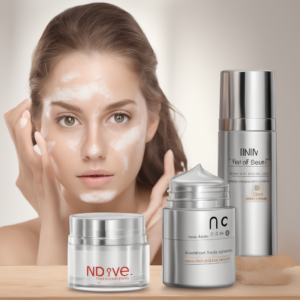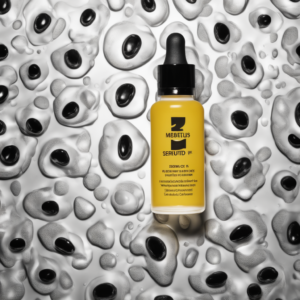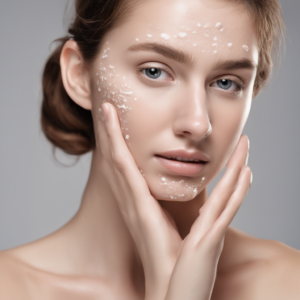How to Say Goodbye to Acne Scars Forever? The Power of Serums
TheContentWeb.com – Your Destination for Skin Care Solutions

Acne scars, the stubborn remnants of past breakouts, can be a real confidence crusher. They linger on your skin, telling tales of the battles your complexion has fought. But fear not, because in the world of skincare, serums are the unsung heroes that can help you bid adieu to those pesky reminders. In this article, we’re diving deep into the realm of serums, exploring how they can effectively remove acne scars for good.
Unveiling the Power of Serums
Serums are concentrated skincare products that contain a potent blend of active ingredients. These little miracle workers are designed to penetrate deep into your skin and target specific concerns. When it comes to banishing acne scars, here’s how serums make it happen:
Lactic Acid: Lactic acid is one of the alpha hydroxy acids (AHAs) that can work wonders for your skin. It gently exfoliates, removing dead skin cells and promoting cell turnover. This not only helps fade scars but also brightens your complexion.
Salicylic Acid: Ideal for acne-prone skin, salicylic acid dives into your pores, unclogging them and preventing future breakouts. It’s also great at reducing inflammation and redness associated with post-inflammatory hyperpigmentation.
Hyaluronic Acid: While hyaluronic acid won’t directly fade scars, it’s a hydrating powerhouse. Well-hydrated skin looks plump and healthy, making scars less noticeable. Plus, it helps in the overall healing process.
The Process of Scar Removal
Removing acne scars with serums is not an overnight endeavor. It requires patience and consistency. Here’s a step-by-step guide to speed up the process:
1. Cleanse: Start with a gentle cleanser to rid your skin of impurities.
2. Exfoliate: Use a serum with AHAs like glycolic acid or lactic acid to exfoliate dead skin cells.
3. Treat: Apply a serum specifically formulated to treat acne scars. Look for ingredients like niacinamide, vitamin C, and peptides.
4. Moisturize: Lock in the goodness with a moisturizer. Hyaluronic acid-infused ones are a great choice.
5. Sun Protection: Always wear sunscreen, even on cloudy days. UV rays can worsen scars and hyperpigmentation.
Choosing the Right Serums
Not all serums are created equal. To effectively treat acne scars, consider these options:
1. Niacinamide Serums: Niacinamide helps fade dark spots and improve skin tone.
2. Vitamin C Serums: Vitamin C brightens skin and reduces the appearance of scars.
3. Peptide Serums: Peptides stimulate collagen production, plumping up the skin and minimizing the depth of scars.
4. Retinol Serums: Retinol speeds up cell turnover, fading scars over time.

The Role of Chemical Peels
In your quest to remove acne scars, you may also want to consider chemical peels. These treatments use acid solutions to exfoliate the top layer of skin, revealing a smoother, scar-free complexion. However, they should be done by a professional and are not suitable for all skin types.
Dealing with Specific Scars
Different types of acne scars require tailored approaches:
– Ice Pick Scars: These deep, narrow scars may benefit from microneedling or laser treatments, in addition to serums.
– Rolling Scars: Subcision, a medical procedure that breaks the fibrous bands causing rolling scars, can be combined with serums for better results.
– Keloid Scars: Seek medical advice as keloid scars are challenging to treat at home.
Now that we’ve established the importance of serums in tackling acne scars, let’s delve into the science that makes them so effective. Understanding the mechanisms behind these potent concoctions will empower you to make informed choices and optimize your skincare routine for that radiant complexion.
The Alpha Hydroxy Acids (AHAs) Advantage
Lactic Acid and Glycolic Acid: AHAs, such as lactic acid and glycolic acid, are your allies in the fight against acne scars. They work their magic through exfoliation. As dead skin cells are sloughed away, scars become less noticeable. Additionally, these AHAs stimulate collagen production, which over time can help smooth out skin texture.
Salicylic Acid: The Pore Purifier
For those struggling with acne-prone skin, salicylic acid is a game-changer. It dives deep into your pores, clearing out excess oil and preventing future breakouts. By keeping your skin clean and free of new blemishes, it indirectly aids in reducing the appearance of scars.
For more about this please read this SALICYLIC ACID PEELS: THE ULTIMATE SOLUTION FOR ACNE-PRONE SKIN

Niacinamide: The Scar Fader
Niacinamide, also known as vitamin B3, is a versatile ingredient. It not only helps fade dark spots and acne scars but also strengthens the skin barrier. A robust skin barrier is essential for overall skin health and resilience against future breakouts.
Vitamin C: Brightening Elixir
Vitamin C is a superstar when it comes to brightening your skin tone. It inhibits the production of melanin, the pigment responsible for dark spots and hyperpigmentation. By doing so, it gradually reduces the appearance of scars, leaving you with a more even complexion.
Peptides: Collagen Boosters
Peptides are short chains of amino acids that signal your skin to produce more collagen. Collagen is the protein responsible for the plumpness and elasticity of your skin. By incorporating peptide-rich serums into your routine, you encourage your skin to rebuild itself, making scars less noticeable.
Retinol: The Skin Transformer
Retinol, a form of vitamin A, accelerates skin cell turnover. This means that newer, healthier skin cells replace the old ones more rapidly. Over time, this process helps reduce the depth of scars and evens out skin texture.
Hyaluronic Acid: The Hydration Hero
While hyaluronic acid doesn’t directly target scars, its hydrating properties are essential for a healthy complexion. Well-moisturized skin appears plump and smooth, making scars less noticeable. Hyaluronic acid-infused serums lock in moisture, contributing to the overall scar-fading process.
The Role of Chemical Peels Revisited
As we explore the science behind serums, it’s worth mentioning how chemical peels fit into the equation. Chemical peels work by applying acid solutions to the skin, causing controlled exfoliation. This process helps remove the top layer of damaged skin, revealing fresher, scar-reduced skin beneath. However, it’s crucial to consult with a skincare professional before considering chemical peels, as they can be too harsh for some skin types.
Tailoring Your Serum Arsenal
With a deep understanding of the key ingredients in serums, you can tailor your skincare routine more effectively. TheContentWeb.com offers a curated collection of serums designed for various skin types and concerns, ensuring that you have access to the best products to address your specific needs.
Don’t forget that everyone’s skin is unique, and what works for one person may not work for another. Patience and consistency are your allies in the quest to remove acne scars for good.
Conclusion
Say goodbye to acne scars forever by harnessing the power of serums and a consistent skincare routine. The Content Web offers a curated collection of the best serums for acne scars, ensuring you have the right tools to achieve flawless skin. Don’t let those scars define you; let them become a distant memory.
For more skincare tips and product recommendations, explore our multi-brand store at The Content Web. Your journey to radiant, scar-free skin begins here. Remember, patience and persistence are the keys to success in the battle against acne scars.